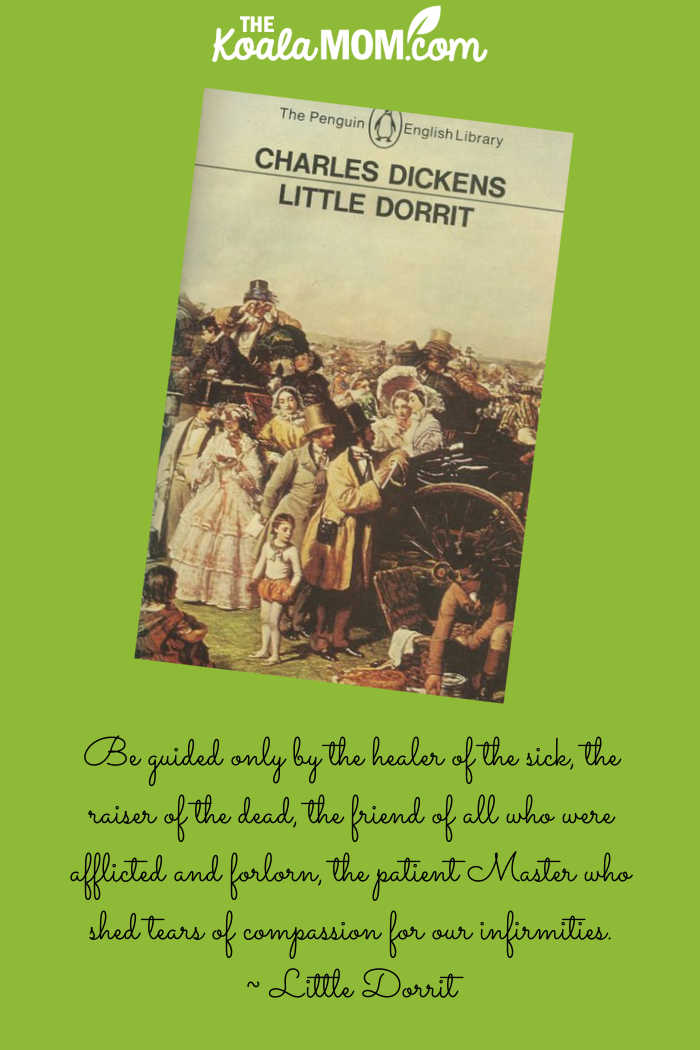Sometime before Christmas, I felt like I’d been reading new novels for quite a while and it was time to get back to something 19th century. I went through my Dickens collection for a title I hadn’t read yet and found Little Dorrit. After Christmas, I took a break from it to read Say You’re One of Them for book club and Thicker Than Blood for review and finally finished Little Dorrit just before my next books for review arrived.

This post contains affiliate links; as an Amazon associate, I earn from qualifying purchases.
Little Dorrit plot overview
Little Dorrit has been born and raised in Marshalsea prison, where her father has been held for over twenty years due to his debts. She is free to come and go from the prison and earns money by working as a seamstress outside the walls. She attracts the attention of her employer’s son, Arthur, who helps her father get out of prison. However, when Arthur himself ends up in prison for debt, he feels he can’t ask Little Dorrit to marry him. In a typical Dickens twist, it is discovered that Arthur’s mom has been withholding money from him and the Dorrits. Released from prison, Arthur is now free to marry Little Dorrit and they live happily ever after.
Like many other Dickens novels, Little Dorrit was written with the intent to educate as well as entertain. Through the story of the Dorrits, Dickens tries to raise awareness of the issue of debtors’ prisons in England. The story delves into themes of poverty, class and societal injustice.
Thoughts on Little Dorrit
As I read the novel, I thought of how novels have changed in the last two hundred years. What Dickens wrote was hugely popular with the readers of his day, but wouldn’t make it past an editor today. Little Dorrit begins with a long (albeit beautiful) description of Marseilles that leaves the reader wondering when on earth we’re going to get into the story. More long passages of description and even longer bits of satirical commentary on the state of English politics are scattered throughout the book. Nowadays, we expect more action and less description.
Yet among those slow, boring passages are the parts that keep readers coming back to Dickens today: the sentences you want to read two or three times, because they are so perfect; the hilarious and easily pictured characters; and the plot twists and turns to figure out. Several characters in particular made me think “only Dickens.” One is Flora, who talks in long, run-on sentences that make hardly any sense. Another is Pancks, always described as a steam ship in his comings and goings and “dockings.”
One passage that caught my attention was far towards the end of the book. In a beautiful statement of faith, Little Dorrit tells her bitter old mistress,
Be guided only by the healer of the sick, the raiser of the dead, the friend of all who were afflicted and forlorn, the patient Master who shed tears of compassion for our infirmities. We cannot but be right if put all the rest away, and do everything of remembrance of Him. There is no vengeance and no infliction of suffering in His life, I am sure. There can be no confusion in following Him, and seeking for no other footsteps, I am certain.
That statement is all the more powerful because we have seen Little Dorrit live it out through the novel.
Bleak House and David Copperfield are probably still my favourite Dickens novels, but Little Dorrit was a good read too—a satisfying Dickens story of complicated connections and happy endings.
If you enjoy Charles Dickens, you may also like the novels of his contemporary, Wilkie Collins.

3 Comments
Hi Koala, Little Dorrit and David Copperfield are on my list for this year. Thanks for the review, I know I’ll enjoy this book.
Eileen – a Dickens is a must-read for everyone, though if you’ve never read any, I’d recommend starting with one like Bleak House or David Copperfield. All his novels are good, but some require more work to read (or maybe I just shouldn’t have been reading Little Dorrit on breaks from work with lots going on around me!). 🙂
Thanks for stopping by my blog and please know that I’m praying for you, too with your bout with depression. Seems to be going around. May the journaling bring you much light and joy!!!
I’ve never heard of any of those Dicken’s novels. I think I better take a closer look at classics. They sound wonderful!